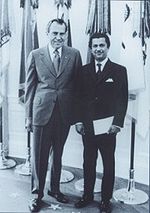
Enayet Karim
Encyclopedia

Matriculation
Matriculation, in the broadest sense, means to be registered or added to a list, from the Latin matricula – little list. In Scottish heraldry, for instance, a matriculation is a registration of armorial bearings...
examination and later studied economics at University of Dhaka
University of Dhaka
The University of Dhaka is the oldest university in Bangladesh. It is a multi-disciplinary research university and is among the top universities in the region. Established on July 21, 1921, as per the Government of India Act, 1920, it was modelled on the Universities in England and soon gained...
. After a brief teaching career with the same University, Karim joined the Pakistan Foreign Service in 1952. Karim served the Pakistani Missions in both Calcutta and New Delhi
New Delhi
New Delhi is the capital city of India. It serves as the centre of the Government of India and the Government of the National Capital Territory of Delhi. New Delhi is situated within the metropolis of Delhi. It is one of the nine districts of Delhi Union Territory. The total area of the city is...
before assuming the key post of Director (India) in the Pakistan Foreign Ministry. In early 1970, Karim left Islamabad and took up the post of Counselor at the Pakistan Embassy in Washington DC.
In the initial stage of Bangladesh Liberation War
Bangladesh Liberation War
The Bangladesh Liberation War was an armed conflict pitting East Pakistan and India against West Pakistan. The war resulted in the secession of East Pakistan, which became the independent nation of Bangladesh....
, Karim propagated the cause of the independence of Bangladesh in the US diplomatic arena. But immediately afterwards Karim suffered two consecutive heart attacks within months and was hospitalized. In August 1971, the Bengali
Bengali people
The Bengali people are an ethnic community native to the historic region of Bengal in South Asia. They speak Bengali , which is an Indo-Aryan language of the eastern Indian subcontinent, evolved from the Magadhi Prakrit and Sanskrit languages. In their native language, they are referred to as বাঙালী...
officers at the US Embassy formally announced their allegiance with the provisional Bangladesh Government. Karim joined them, risking the well-being of his family, in spite of his poor health conditions.
After the independence of Bangladesh, Karim was nominated as the first Ambassador from Bangladesh to USA. But after a very short time, he was asked to assume the role of Foreign Secretary of Bangladesh. Despite his delicate health conditions, Karim accepted the challenge and started working day and night to safeguard and promote the national interests of Bangladesh. With a minimum human resource support, he embarked on the mission to bring about recognition of Bangladesh by as many countries as possible. He also maintained international efforts to reconstruct war-ravaged Bangladesh under the UN Relief Operations, and to secure bilateral assistance from US and other major donors. His other major tasks were: reaching accords with New Delhi and Islamabad for the release of Pakistani POWs and war crime trial, repatriation of the stranded Bengalis from Pakistan and the Pakistanis from Bangladesh, and the distribution of assets and liabilities of the former federal government of Pakistan.
In February 1974, while working at his office, Karim suffered his third heart attack which later proved fatal. In 1977, the Government of Bangladesh, honored him by posthumously awarding him the Independence Day Award
Independence Day Award
The Independence Day Award , also termed Independence Award , is the highest state award given by the government of Bangladesh. Introduced in 1977, this award is bestowed upon Bangladeshi citizens or organizations in recognition of substantial contribution to one of many fields, including the War...
, the highest civilian award of the country.

